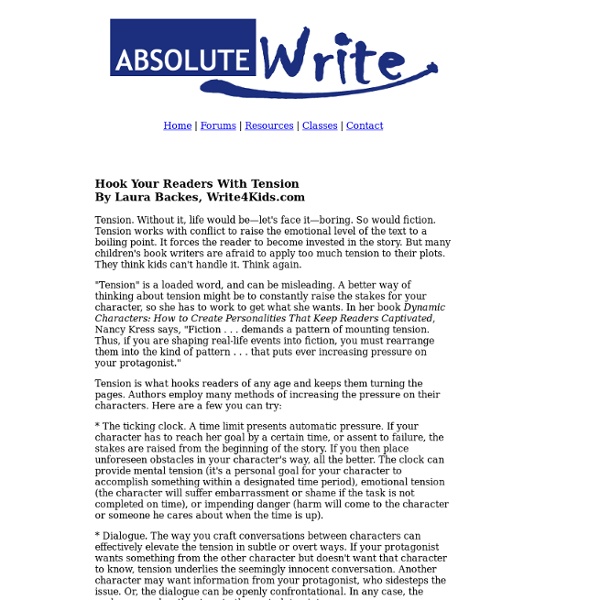



http://absolutewrite.com/novels/tension.htm
Writing The Perfect Scene Having trouble making the scenes in your novel work their magic? In this article, I’ll show you how to write the “perfect” scene. Maybe you think it’s impossible to write the perfect scene. After all, who can choose every word perfectly, every thought, every sentence, every paragraph? Give Your Writing More “Body” This month’s book review is an overview of my favorite “dead body” books. Whether you are writing a mystery, suspense, action, or any sort of fiction, these are excellent tools for getting the details right, plus they make for terrific Halloween reading. Another way you can use these books is as a brainstorming tool. It’s amazing what paths of thinking and creativity will open for you as you turn the pages. When you research with these books (as opposed to the web) no gruesome or sensationalistic photos will take you by surprise and keep you up nights.
Eight Secrets Which Writers Won’t Tell You Image from Flickr by Lazurite This is not particularly relevant to the post, but I’m getting an awful lot of comments telling me, often a little snarkily, “it’s ‘THAT’ not ‘WHICH’”. The “don’t use which for restrictive clauses” rule comes (as far as I can tell) from Strunk and White. General Fiction Getting Around... Career Essentials Getting Started Queries & Manuscripts Market Research Classes & Conferences Critiquing Crafting Your Work Grammar Guides Research/Interviewing Writing Contests The Writing Business Income & Expenses Selling Reprints Collaboration Pseudonyms Negotiating Contracts Setting Fees/Getting Paid Rights & Copyright Tech Tools
mental_floss Blog » How to Write Movie Scenes Ever wondered how screenwriters do their thing? Lots of people have, and there's a whole genre of books out there devoted to helping up-and-comers understand the arcane art of movie-writing. Despite all the screenwriting panels and workshops and books and DVD commentaries in the world -- all the billions of words printed about screenwriting and how it's done -- when it comes down to it, most writers are relatively private about the nitty-gritty of their process.
Story And Plot Michael Arndt on setting a story in motion Michael Arndt explains some of the things he learned while working on the screenplay for Toy Story 3. Groundhog Day John and Craig pay their respects to Harold Ramis with an episode devoted entirely to Groundhog Day. Point of View in Creative Nonfiction I read a lot of novels, and poetry, and even the occasional screenplay/drama. I enjoy them; I learn from them; I find them delicate, and robust, and powerful, and skillful and all the things that make good writing. BUT when I want to really understand something, when I want to feel it in the center of my chest, when I want my cheeks to be rasped with the reality of life, I turn to creative nonfiction. There’s just something about the authenticity of the writer’s perspective there that makes me connect more fully. I’ve been trying to articulate the difference in connection I feel between fiction and nonfiction ever since my friend @karriehiggins were talking about it on Twitter the other night. We were discussing ownership in writing – as in who “owns” their perspective more?
How I use OneNote for my Dissertation « ProtoScholar The question came up recently about how I am using OneNote for my dissertation note taking. Sometimes show is easier than tell. I have one OneNote notebook called Dissertation. Within it, I have 8 sections: A few things about this: The Age of the Essay September 2004 Remember the essays you had to write in high school? Topic sentence, introductory paragraph, supporting paragraphs, conclusion. The conclusion being, say, that Ahab in Moby Dick was a Christ-like figure. Oy. So I'm going to try to give the other side of the story: what an essay really is, and how you write one. 102 Resources for Fiction Writing « Here to Create UPDATE 1/10: Dead links removed, new links added, as well as Revision and Tools and Software sections. Are you still stuck for ideas for National Novel Writing Month? Or are you working on a novel at a more leisurely pace?
20 Common Grammar Mistakes That (Almost) Everyone Makes I’ve edited a monthly magazine for more than six years, and it’s a job that’s come with more frustration than reward. If there’s one thing I am grateful for — and it sure isn’t the pay — it’s that my work has allowed endless time to hone my craft to Louis Skolnick levels of grammar geekery. As someone who slings red ink for a living, let me tell you: grammar is an ultra-micro component in the larger picture; it lies somewhere in the final steps of the editing trail; and as such it’s an overrated quasi-irrelevancy in the creative process, perpetuated into importance primarily by bitter nerds who accumulate tweed jackets and crippling inferiority complexes.
Characterisation How to write convincing characters Characterisation - the task of building characters - isn't easy. But if you're struggling to build characters with real life and vigour, just follow these rules. If you do follow them correctly, we can pretty much guarantee that your characterisation will be just fine! Know what kind of character you are writing
25 Insights on Becoming a Better Writer When George Plimpton asked Ernest Hemingway what the best training for an aspiring writer would be in a 1954 interview, Hem replied, “Let’s say that he should go out and hang himself because he finds that writing well is impossibly difficult. Then he should be cut down without mercy and forced by his own self to write as well as he can for the rest of his life. At least he will have the story of the hanging to commence with.” Today, writing well is more important than ever.